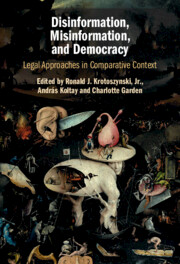Disinformation, Misinformation, and Democracy
In today’s digital age, the spread of disinformation and misinformation across traditional and social media poses a significant threat to democracy. Yet repressing political speech in the name of truth can also undermine democratic values. This volume brings together prominent legal scholars from democracies worldwide to explore and evaluate different regulatory approaches for addressing this complex problem – all taking into account that the cure must not be worse than the disease. Using a comparative lens, the book offers important and novel insights into methods ranging from national regulation of politicians’ speech to empowering civil-society groups that are well-positioned to blunt the effects of disinformation and misinformation. The book also provides solutions-oriented recommendations for policymakers, judges, legal practitioners, and scholars seeking to promote democratic values by encouraging free political speech while combatting disinformation and misinformation. This title is also available as Open Access on Cambridge Core.
Ronald J. Krotoszynski, Jr. is the John S. Stone Chair, Director of the Program in Constitutional Studies and Initiative for Civic Engagement. He is the author of numerous law review articles and several books, including Free Speech as Civic Structure (2024) and The Disappearing First Amendment (2019).
András Koltay is Research Professor at the Ludovika – University of Public Service (Budapest) and Professor of Law at Pázmány Péter Catholic University (Budapest). His principal research has been concerned with freedom of speech, personality rights, and media regulation. He is the author of Media Freedom and the Law (2024) and New Media and Freedom of Expression (2019).
Charlotte Garden is the Julius E. Davis Professor of Law at the University of Minnesota. Much of her scholarship and public commentary considers the relationship among the First Amendment, labor unions, and American democracy. She is a co-editor of The Cambridge Handbook of U.S. Labor Law for the Twenty-First Century (2019).

